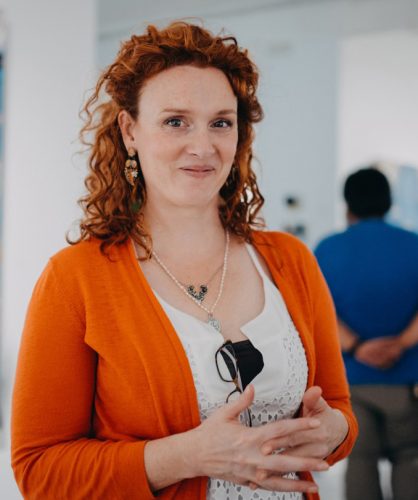Innovative workshop leads to improved faculty onboarding
August 4, 2020

Innovation may be the best thing that has come from the COVID-19 pandemic. Madara Mason, of UAF's eCampus, recently attended a Stanford University teaching and learning workshop held online instead of in-person, as originally planned.
The workshop, offered by Stanford's Hasso Plattner Institute of Design (commonly known as the d.school), was supposed to be a week of in-person meetings. Instead, the program lasted two weeks, partially in synchronous meetings and partially offline.
“The Teaching and Learning Studio is about rethinking about how teaching and learning happens in higher education,” Mason said. “It had an angle to it, and that interested me most, to help people rethink the institutional structures in which they work.”
Mason will share knowledge from the program with the UAF Faculty Development Team, which also includes Amanda White and Rich Collins, to help redevelop the new faculty orientation Aug. 17-18, 2020.
The workshop focused not only on how teaching and learning happens but also on how courses are offered within older institutional structures. Activities got the fellows to think and talk about innovation within those structures.
“Even the way they ran their online learning activity, being an expert in this field, they were doing some things that were new to me,” she added.
Mason said she understands that UAF faculty are dealing with a lot of changes right now. If a faculty member wants to grow in their position, there is currently no central location to find all the resources offered. Some of those resources can be found at UAF's Center for Innovation, Commercialization and Entrepreneurship, eCampus, the Provost’s Office, various campus institutes and the Faculty Development Team.
The development team is creating a faculty accelerator, a term borrowed from startup culture. The accelerator will create a framework for innovation through mentoring networks, learning communities, research partners and teaching cohorts. It also will act as a central location for all development resources available to faculty.
“The activities the d.school were putting me through really helped me uncover the big idea of how we can help faculty become agents of change rather than making them feel like they are passive participants in the process,” Mason said.
So much change can happen despite the rigidity of institutionalized structures. Faculty can have a sense of control, and that’s what Mason wants to facilitate.


